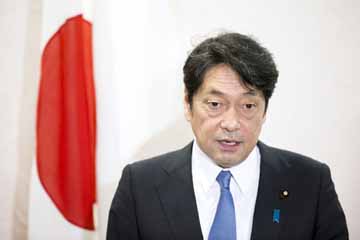
AFP, Tokyo :
North Korea still poses a “serious and imminent threat”, Japan said Tuesday in its first annual defence review since an outbreak of diplomacy on the Korean peninsula.
Japan’s 2018 defence white paper also took aim at China’s rise as a military power, saying Beijing was sparking “strong security concerns in the region and international community, including Japan”.
Last year’s defence review was published at the height of the tensions with North Korea, amid nuclear and missile tests and US President Donald Trump threatening to rain down “fire and fury” on Pyongyang if it kept up its threats.
But since then, a spectacular diplomatic detente has taken place, culminating in the historic summit between Trump and the North’s leader Kim Jong Un in Singapore on June 12.
Nevertheless, Tokyo insisted on Tuesday: “There is no change in our basic recognition concerning the threat of North Korea’s nuclear weapons and missiles.” Pyongyang continues to post “an unprecedentedly serious and imminent threat to Japan’s security and significantly damage the peace and security of the region and the international community”, according to Tokyo.
Japanese Defence Minister Itsunori Onodera acknowledged in the document that North Korea had begun “dialogue” with former foes the US and South Korea.
“But we cannot overlook the fact that, even to this day, it possesses and fully deploys several hundred missiles that put nearly all of Japan within range,” stressed the minister.
In response, Japan is steadily upgrading its capacity to shield the nation from the North’s arsenal, including a plan to spend some $4.2 billion over the next three decades on installing and operating US radar systems.
Despite the historic handshake in Singapore, there has been little progress in denuclearising the Korean peninsula and Washington-Pyongyang relations appear to have taken a turn for the worse, with Trump abruptly scrapping a planned visit to the North by Secretary of State Mike Pompeo.
The white paper also reiterated its worries about China’s increasing military spending and expanding naval ambitions.
It complained that Beijing was trying to “change the status quo by coercion”, referring to such actions as building up disputed islands in the South China Sea and expanding naval activities around East China Sea islands in dispute with Japan.
Meanwhile, US President Donald Trump called off a visit to North Korea by Secretary of State Mike Pompeo after the latter received a belligerent letter from a senior North Korean official just hours after the trip was announced last week, the Washington Post reported on Monday.
The Post quoted two unnamed senior US administration officials as saying the letter came on Friday from Kim Yong Chol, vice chairman of North Korea’s ruling Workers’ Party Central Committee, who led previous rounds of talks with Pompeo.
The newspaper said the exact contents of the message were unclear, but it was sufficiently belligerent that Trump and Pompeo decided to call off the journey.
The planned trip had been announced the previous day for this week and Pompeo had intended to introduce a newly named special envoy, Stephen Biegun, to his North Korean counterparts.
The White House referred queries on the Washington Post report to the State Department, which did not immediately respond to a request for comment.
In cancelling Mike Pompeo’s trip, Trump publicly acknowledged for the first time that his effort to get North Korea to denuclearise had stalled since his June 12 summit with its leader, Kim Jong Un
On Sunday, North Korea’s state media accused the United States of “double-dealing” and “hatching a criminal plot” against the country, but did not mention Pompeo’s cancelled visit.
US intelligence and defence officials have repeatedly expressed doubts about North Korea’s willingness to give up its nuclear weapons and did not expect Pompeo’s trip to yield positive results.

